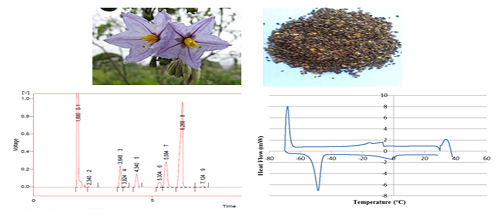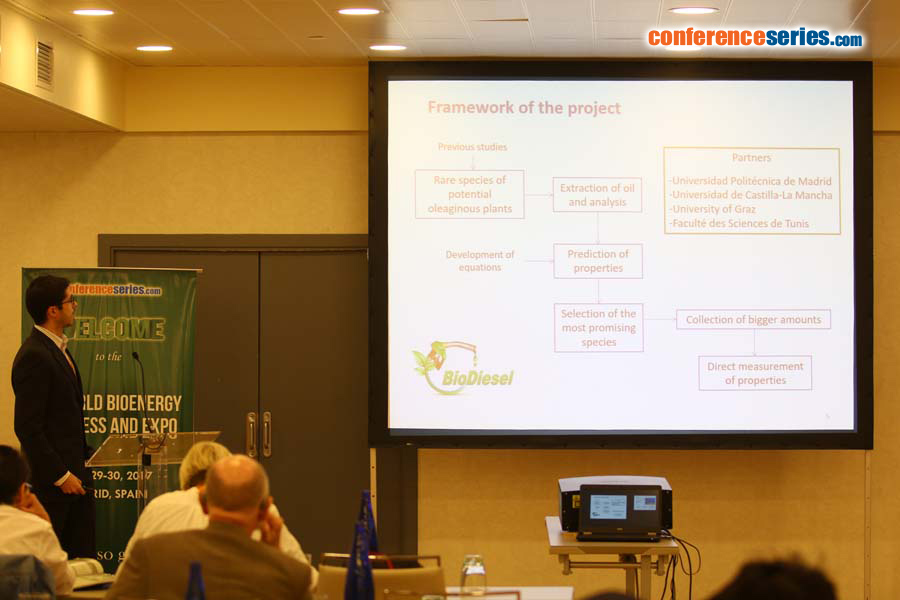
David Bolonio
Universidad PoliteÌcnica de Madrid, Spain
Title: Fatty acid methyl esters (FAMEs) obtained from rare seeds of Tunisia: Ibicella lutea, Peganum harmala, Smyrnium olusatrum, Onopordum nervosum and Solanum elaeagnifolium
Biography
Biography: David Bolonio
Abstract
The transport sector is a major energy consumer with the 27 % of the total energy used worldwide. This energy is almost completely provided by petroleum, a non-renewable resource that is concentrated in politically unstable countries and that causes global warming due to the greenhouse gas effect. Due to this situation, and the increase in the demand and the oil price, it is necessary to search for alternatives which may be used as transport fuels. One of the most viable alternatives are fatty esters, as they have similar properties to fossil fuels and they can be used as substitutes of conventional fuels without making big modifications to engines. This work aims to study the properties of fatty acid methyl esters (FAMEs) from Tunisian oils in order to assess their potential use as biofuel sources. The oils chosen for this study have been scarcely researched by other authors and are very interesting for a possible exploitation as fuels. Some of them are non-edible sources and all of them can be grown in arid places with no need of supplementary water: Ibicella lutea, Peganum harmala, Smyrnium olusatrum, Onopordum nervosum and Solanum elaeagnifolium. Their properties (cloud point, pour point cold filter plugging point, oxidation stability, cetane number, density, kinematic viscosity and heating value) have been predicted using equations that correlate the above properties with their ester profiles, measured with gas chromatography (GC-FID) and gas chromatography coupled with mass spectrometry (GC-MS), and crystallization onset temperature (COT), measured by differential scanning calorimetry (DSC). The work concludes with the comparison of the properties of the biodiesel obtained from these oils and the analysis of their possible use as biofuel sources.

Recent Publications:
- Neifar, M., Chouchane, H., Maktouf, S., Gara, J., Jaouani, A., & Cherif, A. (2016). Improved sugar yield for bioethanol production by modelling enzymatic hydrolysis of Peganum Harmala biomass through response surface methodology.
- Evergetis, E., & Haroutounian, S. A. (2014). Exploitation of apiaceae family plants as valuable renewable source of essential oils containing crops for the production of fine chemicals. Industrial Crops and Products, 54, 70-77.
- Arfaoui, M. O., Renaud, J., Ghazghazi, H., Boukhchina, S., & Mayer, P. (2014). Variation in oil content, fatty acid and phytosterols profile of Onopordum acanthium L. during seed development. Natural product research, 28(24), 2293-2300.
- Kolisis, F. N., Sotiroudis, T. G., & Sotiroudis, V. T. (2010). The potential of biodiesel production from fatty acid methyl esters of some European/Mediterranean and cosmopolitan halophyte seed oils. Journal of ASTM International, 7(3), 1-9.
- Bolonio, D., Llamas, A., Rodríguez-Fernández, J., Al-Lal, A. M., Canoira, L., Lapuerta, M., & GoÌmez, L. (2015). Estimation of cold flow performance and oxidation stability of fatty acid ethyl esters from lipids obtained from Escherichia coli. Energy & Fuels, 29(4), 2493-2502.
- Lapuerta, M., Rodríguez-Fernández, J., & Armas, O. (2010). Correlation for the estimation of the density of fatty acid esters fuels and its implications. A proposed biodiesel cetane index. Chemistry and physics of lipids, 163(7), 720-727.
Speaker Presentations
Speaker PPTs Click Here


